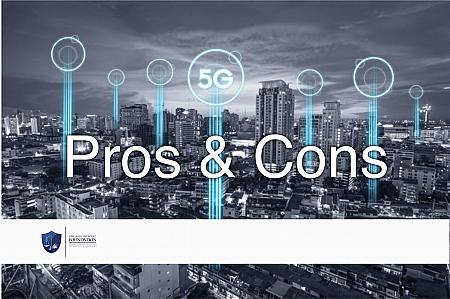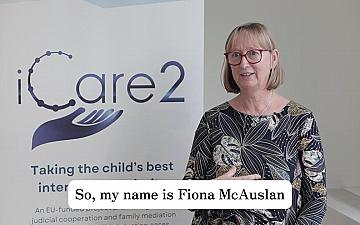
5G: Exposing the myths
Author: Nikola Stoychev
- What is the difference between 5G and 4G?
5G, or the fifth generation of wireless mobile technology, is a standard for the construction and operation of mobile wireless networks such as 4G / LTE, 3G, 2G, etc. The main difference between 5G and the previous technologies lies in the fact, that because of the way the 5G network is built, the equipment used and new range on the radio spectrum, it will allow higher data rates while transferring a larger quantity of data, far less errors and delay in data transfer, as well as increased reliability.
- Are there any side effects of applying 5G technology to the human body?
There is not scientific evidence that has been published for any specific negative effects of 5G technology on the human body yet. Like previous generations (2G, 3G, 4G / LTE) technologies, 5G technologies use radio waves as a mean of information. However, it is important to emphasize that the radio spectrum that can be used for 5G (e.g. 700 MHz, 800 MHz, 2.6 GHz, 3.5 GHz) has been used so far for mobile communications. Hence, it is not a new kind of radiation, that appears for the first time and that has some new effect on the human body.
In this sense, the effects that are inherent in all non-ionizing radiation (i.e., those that do not affect the structure of DNA), are widely represented and used in everyday life by other wireless technologies, such as Bluetooth, Wi-Fi, etc., which means that they should be the same as for 5G.
In this regard, it will be noted that according to publication of the World Health Organization (more here): “To date (27.02.2020) and after much research performed, no adverse health effect has been causally linked with exposure to wireless technologies.” This conclusion applies to 5G but it is based on studies across the radio frequency spectrum.
To limit the effects of non-ionizing radiation, each country has introduced limits on the permissible transmitting power of equipment (e.g., mobile operators' base stations, radio and television broadcasters, civil aviation radar stations, etc.) – i.e. radiation power levels at which there is no risk to human health. In Bulgaria, the statutory limits are much stricter than the recommended international limits established by the International Committee on Non-Ionizing Radiation (ICNIRP) (which are considered sufficiently safe for the protection of human health). Therefore, in Bulgaria, much more restrictive requirements for equipment have been introduced to protect the population. These stricter requirements will also apply to 5G, as they have previously applied to 2G, 3G and 4G / LTE networks.
- What are the problems and concerns associated with 5G technology?
Each new technology raises certain fears due to a lack of knowledge about its type. There were similar concerns about 3G, 4G, Wi-Fi, Bluetooth, microwave ovens, radiant heating, etc., but these fears proved to be unreasonable. These technologies are now so strongly embedded in our daily lives that we cannot even imagine what life was without them.
Firstly, concerns about 5G come from the fact that the public is not well informed about the functioning, risks and benefits of its introducing, which, in combination with false news and conspiracy theories, leads to a negative attitude towards this novelty.
Among other things, the main concerns regarding the 5G technology are about the way the network is built and operated, since 5G requires a denser network of facilities. To put it in a simple way - more base stations/cells need to be located closer to each other. This leads to the assumption that we might be exposed to more electromagnetic radiation, which is more harmful to us. Such assumptions, however, are extremely speculative and misleading because they neglect other very important factors such as radiating power, distance from the transmitter, etc. As mentioned, Bulgarian legislation is one of the strictest in the EU as far as permissible levels of radiation are concerned, which serves as a guarantee for the rights and health of citizens.
Another major concern relates to the radio frequencies used. Since in the deployment of 5G is planned to be used higher frequencies, such as 26 GHz and 28 GHz, which are not as widely used and claimed to be subjected to further study. However, at this stage, this is not so much of a concern, since the request of mobile operators for the operation of 5G in Bulgaria, is that they will use the same radio frequencies currently used for 4G / 3G, i.e. 700 MHz, 800 MHz, 2.6 GHz, 3.5 GHz.
- Are 5G networks reliable and secure?
There is no reason to doubt the security and reliability of the 5G networks than there is to other existing networks. There is no network or system that is not vulnerable and susceptible to security breaks (there won’t be one) and there will be a number of deficiencies in the development of the 5G network that will need to be improved, including in terms of equipment.
In this context, it is important to emphasize that Recommendation (EU) 2019/534 of 26 March 2019 has been issued within the EU, which aims to give general guidance on the cybersecurity of 5G networks. In addition, several acts at European and national level have been adopted in the last few years to guarantee precisely the protection and security of network and information technologies (the Network and Information Security Directive, the National Cybersecurity Law). New powers have also been given to the EU Cybersecurity Agency (ENISA), which will play a significant role in the development of EU-wide cybersecurity certification schemes, including on 5G networks.
Earlier this year, the European Commission also approved a toolkit for counteracting the cybersecurity risks associated with the deployment of 5G - fifth generation mobile networks.
In these circumstances, we believe that relatively effective measures are being established and adopted to make 5G networks function in a safe and secure environment, although the risks of security breaches could never be completely limited in both the physical and in the electronic world. Last but not least, we must also remember that network security is strongly conditioned by the human factor.
- What is the meaning of 5G application for the consumers?
With the deployment of the 5G networks, a wide range of services will be developed that are essential for the functioning of the economy, for the fulfillment of important social and economic functions, quality leaps in sectors such as energy, transport, banking, healthcare and all other online activities.
The deployment of 5G will allow the accelerated development and introduction of new services such as telemedicine, autonomous vehicles and traffic management, connected cities, smart energy networks and defense facilities, viewing high quality content (5K, 3D), etc.
Moreover, in a situation like the current one, the importance of 5G networks is even more visible - in many countries, telecom operators are already seeing a huge increase in traffic, resulting in slower speeds, lower quality of service and other problems for consumers. The European Commission has even asked the global giants Google, Netflix, Amazon, Facebook and more to reduce the quality of video content in Europe, in order to limit the risk of network congestion and blockage.
With the construction of the 5G network, such occurrence should not be observed, since the network will have much greater capacity.








